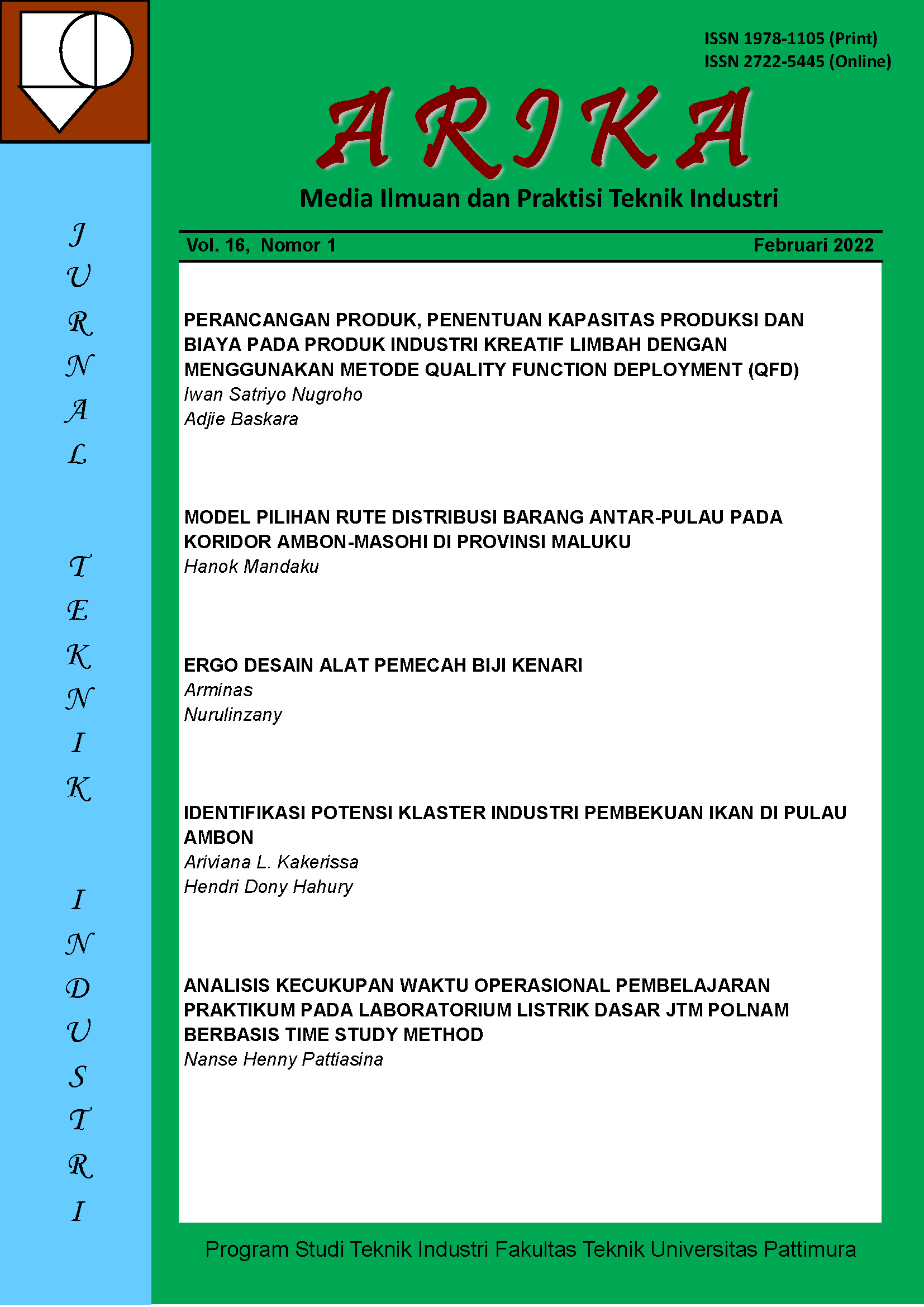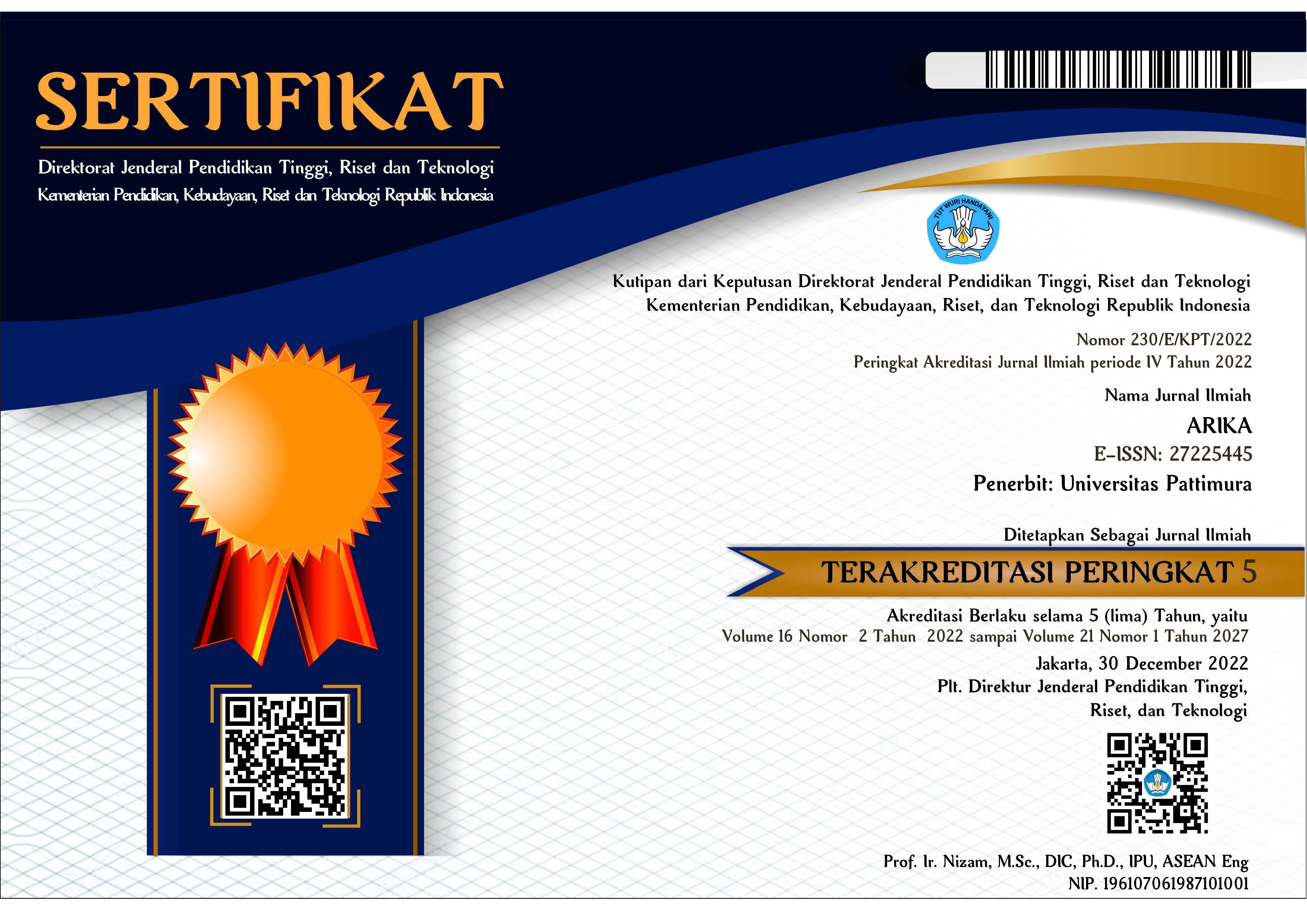Analisis Kecukupan Waktu Operasional Pembelajaran Praktikum pada Laboratorium Listrik Dasar JTM Polnam Berbasis Time Study Method
Abstract
Implementasi proses pembelajaran praktikum mahasiswa memerlukan efektivitas gerakan yang tepat dengan tempo kerja normal sehingga terukur secara baik guna pencapaian waktu kerja yang efisien. Tujuan penelitian ini adalah untuk mengetahui optimalisasi capaian waktu kerja mahasiswa menyelesaikan praktikum dalam fungsi dan perannya sebagai operator dengan pengukuran kerja berbasis metode stopwatch time study. Proses pembelajaran difokuskan pada bidang otomotif untuk kerja kelistrikan otomotif pada laboratorium listrik dasar jurusan teknik mesin Politeknik Negeri Ambon. Aktifitas praktikum meliputi pembuatan rangkaian dan aplikasi lampu kepala, sistem klakson dan system penerangan. Peralatan yang dipergunakan yaitu tool box kelistrikan, kabel, test lamp dan multimeter. Hasil perhitungannya menunjukkan bahwa besaran waktu normal (Wn) 3,39 jam dan waktu standar (Ws) untuk mahasiswa menyelesaikan tiga job praktikum adalah 4,21 jam per mahasiswa, dengan akumulasi 21,05 jam untuk setiap grup praktikum yang berjumlah 5 mahasiswa. Sehingga perolehan besaran satuan kredit semesternya mencapai 1,485 atau setara dengan 1,5 sks dimana realisasi kelebihan beban kerja 0,5 sks dapat teralokasi untuk mata kuliah praktikum lainnya dengan beban kerja yang lebih bervariatif. Capaian optimalisasi waktu kerja praktikum kelistrikan otomotif sudah dapat terpenuhi hanya dengan besaran 1,5 sks atau setara dengan 255 menit praktikum/minggu/semester.
Downloads
References
Damayanthi, H. dan Hidayat, S. (2020). Pengukuran Waktu Baku Stasiun Kerja Pada Pipa Jenis Sio Menggunakan Metode Jam Henti di PT.XYZ. Seminar dan Konferensi Nasional IDEC 2020, 1-9.
Pattiasina, N.H. (2017). Implementasi Metode Time Study Pada Kegiatan Praktikum Kerja Las-1, Jurusan Teknik Mesin, Politeknik Negeri Ambon
Prayuda, S.B. (2020), Analisis Pengukuran Kerja Dalam Menentukan Waktu Baku Untuk Meningkatkan Waktu Produktivitas Kerja Pada Produksi Kerudung Menggunakan Metode Time Study Pada UKM Lisna Collection Di Tasikmalaya. Jurnal Mahasiswa Industri Galuh, 1(1), 120-126.
Rahma, M. dan Pratama, A.J. (2019). Pengukuran Waktu Baku Stasiun Kerja Perakitan Komponen Pesawat Garuda Indonesia Temperature Control Valve (TCV) Menggunakan Metode Jam Henti Pada PT.GMF Aeroasia. Seminar Nasional IENACO-2019, 16-23.
Sutalaksana, Iftikar Z. (2006). Teknik Tata Cara Kerja. Laboratorium Tata Cara Kerja & Ergonomi, Departemen Teknik Industri ITB, Bandung
Wignjosoebroto S. (2003) Ergonomi, Studi Gerak dan Waktu. Penerbit Guna Widya, Surabaya
Wignjosoebroto S. (1993). Pengantar Teknik Industri. Penerbit PT. Guna Widya, Jakarta
Wignjosoebroto S. (1992). Teknik Tata Cara dan Pengukuran Kerja. Penerbit PT. Guna Widya, Jakarta
Yudisha, N. (2021). Perhitungan Waktu Baku Menggunakan Metode Jam Henti Pada Proses Bottling, Jurnal Vorteks, 2(2), 85-90.
Copyright (c) 2022 Nanse Henny Pattiasina

This work is licensed under a Creative Commons Attribution-ShareAlike 4.0 International License.
An author who publishes in the ARIKA Jurnal agrees to the following terms:
- The author retains the copyright and grants ARIKA journal the right of first publication of the work simultaneously licensed under the Creative Commons Attribution-ShareAlike 4.0 License that allows others to share the work with an acknowledgment of the work's authorship and initial publication in this journal.
- The author is able to enter into separate, additional contractual arrangements for the non-exclusive distribution of the journal's published version of the work (e.g., post it to an institutional repository or publish it in a book) with the acknowledgment of its initial publication in this journal.
- The author is permitted and encouraged to post his/her work online (e.g., in institutional repositories or on their website) prior to and during the submission process, as it can lead to productive exchanges, as well as earlier and greater citation of the published work (See The Effect of Open Access).










